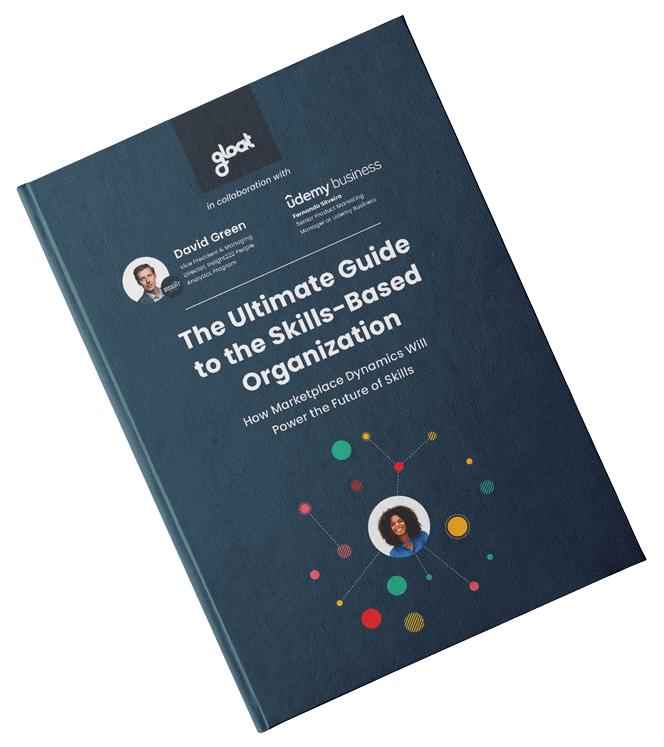Bersin and Mastercard: Build future-ready businesses with workforce agility
How Heather Yurko, VP of Digital Talent, saw Mastercard transform with a workforce agility platform
As economic winds shift, companies are implementing talent marketplaces to build responsive structures
At the onset of the COVID-19 pandemic, Mastercard found itself in the same position as every company in the world: business needs were shifting, resources became scarce, and the path forward became more obfuscated with every passing day.
Heather Yurko, VP of Digital Talent at Mastercard, had seen these transformations before. She saw what talent marketplaces could do before—the ability to break down silos and empower people to take control of their careers—but when time was scarce and demand was scaling, responding to the outpouring of company enthusiasm for a talent marketplace model required leveraging the power of AI.
“Seeing these waves of people put their hands up and say, ‘I’m very interested. I want to do this. This is a passion project.’ Even during a really rough time for them personally, they really wanted to be able to have a sense of giving back, of helping, of enabling our customers,” Yurko said. “And what we found during that first wave was that (our manual talent marketplace) was that it was amazing and wholly unscalable because we were doing this manual matching on the back end; there was no way this was going to work long-term.”
“And so that was when we started to have conversations with Gloat and really understand what was possible,” Yurko said. “Because I’ve seen this done both ways; I’ve seen it done twice manually and then once with an AI-enabled platform; my goodness, you cannot get that kind of scale without having a platform to enable you.”
Her discussion with Josh Bersin and Kristi Enderes touched on what companies need to do to be prepared for not just the economic uncertainty that lies ahead, but for the rapidly-changing realities of business during all circumstances. As we become more globally connected and digital tools play a larger role in our lives, companies that deploy digital-first talent management strategies will be best equipped to face whatever future comes next.
Watch the full discussion above, and check out our guide on building a skills-based organization here.

The ultimate guide to the skills-based organization
As skills become the most sought-after commodity in HR, businesses need to know how to build organizations that support the fostering of skills development—not just acquisition. Learn how enterprises like Unilever, Schnieder Electric, and MetLife utilized their own workforce agility platforms.
‣ Top takeaways
So Kathi and I have this really unique situation where we're getting signals all over the place all the time from companies, from vendors, from technology providers, from investors and from the outside market. And the signals that I'm picking up are obviously huge stress in the workforce, still a shortage of labor, still a shortage of skills, lots of jobs being created, companies moving into service, businesses more and more and more becoming more dependent on the human capabilities of their organization. And the inflation caused by, many, many years of low interest rates has come to bite us.
I have been an investor most of my career and my wife and I have been astounded at the fact that we had almost zero interest rates for almost 14 years. I mean, that is an accident waiting to happen. We are now experiencing the crash of that experience. Money was poured into the economy... I was just listening to Sam Zell last night talk about this, poured into the economy by the federal government, low interest rates, people bought stocks, they bought crypto, they bought houses, they bought everything they could find. And we're done with that. That cycle is coming to an end. That doesn't mean that demand is going down. That doesn't mean we're not going to buy stuff. It doesn't mean we're not going to go on vacation. It doesn't mean we're not going to take care of the rest of the things we want to do, but we have to deal with the fact that the interest rates were too low for too long. And that's the pinch.
Now, as I was talking about earlier, I think we're going to talk ourselves into a recession if we keep talking about it, because people like to talk about, oh, things are terrible and we're going to go into a recession and then people will stop buying things. But I don't see any big economic problem other than the fact that we have to adjust ourselves out of this low interest rate environment and end up in what is called a soft landing. And that is what I think will probably happen. I think we will have us slow down, but I don't think we're going to have a big economic crisis.
It's the speed, because if I'm being honest, the one that we did at Cisco actually was tremendously successful, but it was because it really was tops down and we ended up saving, I think around 900 jobs, out of a much larger number that was out for redeployment. But it was very manual and it took a long time and it was a lot of like checking in with the employees to be like, does this seem okay? We have a couple of options. Like, what do you think? Whereas this, to your point, it's so fast, like you just ... because the employees are driving it. So it's a huge difference in that sense that you really can have a much more employee centric way of driving this forward.
And, it's exciting, the conversations that I've had with people and getting feedback and taking testimonials and just listening, Hey, what else do we need to be thinking about? Or what else should we be doing? It's just been phenomenal that people are saying, I've never had anything like this in my career. There was one quote that was literally, it feels like freedom. Like this feels like this whole new way of working.
I've had folks joining straight from university that are like, this is the coolest thing ever. I feel like I can plan out my whole career here and just being very excited about it. And so we're seeing that feedback through all levels of people's careers and in every part of the organization, which that's like, again, that also feels very different as compared to what I've seen before.
I remember 2008 vividly because it was the first year of our conference and I remember the speech I gave, and the story was about doing less with less. It was about cutting, shrinking and not asking people to do more with less, asking them to do less with less because there was a massive, massive financial crisis and companies were just disappearing, including some big banks and some other companies.
The crisis we're in now is a human crisis of individuals at work being burned out, going through mental health issues, working too many hours, dealing with inflation, dealing with political instability. And how do you grow and manage your company when the employees are just a little bit at their wits end and need some support? That's a totally different situation. And I do believe, as I talked about at our conference, that the solution here is to take care of your employees even better than you have in the past and let them help you get through this because I don't think we're in an economic crisis.
Because I've seen this done both ways, I've seen it done twice manually and then once with an AI-enabled platform, my goodness, you cannot get that kind of scale without a platform to enable you. So to have an internal talent marketplace, to be able to help you very clearly listen to your employees, get information that you may not have in your HRMS around their skills and experiences, around things that they want to do, their own career development and their desires.
When you understand that and then put them in the seat of being able to ignite that passion in themselves for what they want to do, you already know what needs to be done because as project owners, you're putting in like, Hey, I'm looking for people with these skills to help me get this work done. By letting the employees choose, it is such a strong engagement and retention tool and it actually helps reduce burnout because people are doing things that they're excited about and things that are enabling their careers, maybe in different ways.
People have been really excited about getting to explore different functions, different regions, and making those connections across the company, which ultimately drives that kind of agility that you need to be able to move at the speed of business and the speed of the market today.
First talent marketplaces have a great way of creating great careers for people and career development and career opportunities and learning opportunities are always amongst the number one reasons why people leave. People don't leave really because they're not paid enough. They usually don't leave because of that. They usually also don't leave because of their manager...I always feel like the poor middle managers have to bear all the burden of all the things that go wrong from an organizational level.
Like not having something where people can in an agile way, develop their careers, find projects to try something new out. If I'm in HR, maybe I want to try out how it is in marketing. If I'm in marketing, maybe I want to go into sales, right? And usually you've got to quit your job and start a new job if you don't have a talent marketplace that helps you connect with these opportunities. Talent marketplace is a great career development mechanism.
The other thing that we also did is a big study on organization design and how organizations can be more agile and every single company that was at this level four maturity where only 10% or 11% of companies were this highest level, we call it agile and accountable, and every single company that we asked about, how do you actually move in this agile way of working? They said, telemarketplace is a key. You cannot do this without the telemarketplace, because how can you quickly assemble and disassemble teams, if you don't know what skills and capabilities people have and what they want to do and have people find these opportunities to work in these projects that pop up everywhere, cross-functionally, it's not possible. So it's a really fundamental and necessary mechanism to make organizational agility happen.




